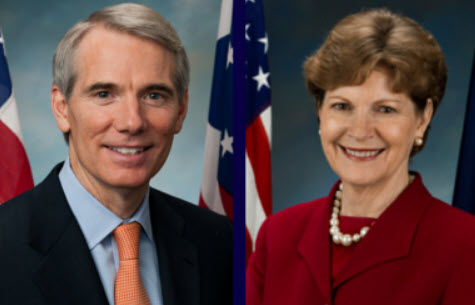
A bipartisan, omnibus energy bill with provisions supported by The Real Estate Roundtable was prepared for debate in the Senate this week, as Republicans and Democrats negotiate a package of amendments that may be added to the base bill.
- The American Energy Innovation Act (S. 2657) – introduced on Feb. 27 by Senate Energy and Natural Resources Committee Chairman Lisa Murkowski (R-AK) and Ranking Member Joe Manchin (D-WV) [ above ] – is a compilation of more than 50 energy-related measures considered and individually reported last year. (Bill Summary and text)
- The AEIA focuses on energy efficiency, renewable energy, energy storage, carbon capture, grid modernization, and workforce development to build energy-related infrastructure.
- The bill includes language supported by The Roundtable to improve the Commercial Building Energy Consumption Survey (CBECS) process.
- AEIA Section 1001 would require Congress to oversee coordination by federal agencies to gather and report higher quality CBECS data – the only nationwide government survey that estimates the number, location, age, energy consumption and other characteristics of the U.S. commercial real estate stock.
- Significantly, CBECS data provides the underpinning for EPA’s ENERGY STAR scores – a key real estate performance “label” relied upon by building owners, investors, and tenants.
- The Senate’s AEIA bill includes other sections of interest to real estate, including authorizations for:
- a “Federal Smart Building Program” to implement and demonstrate smart building technologies across the federal real estate stock;
- a nationwide survey of “Private Sector Smart Buildings” for study and evaluation by the U. S. Energy Secretary;
- codification of the U.S. Energy Department’s “Better Buildings Challenge” – a program that has attracted Roundtable members’ participation; and
- a “CHP Technical Assistance Partnership” to provide project-specific engineering and economic assessments for combined heat and power systems.
- Thus far, Senators have filed over 185 amendments for consideration as additions to the underlying bill. Among them is one offered by Senators Rob Portman (R-OH) and Jeanne Shaheen (D-NH) to drive greater transparency and consideration of building owner costs in the process to develop model building energy codes. (Roundtable Weekly, July 19, 2019). The Roundtable has long-supported the Portman-Shaheen energy codes provisions, which Portman addressed this week on the Senate floor.
- ENR Chairman Murkowski said this week she was working on a “managers’ package” of certain, less controversial measures to be voted on in a block. “I want to have a managers’ package, but it is entirely possible — we’ve seen it before — that that opportunity is spoiled,” she said. (CQ, March 4)
If Republicans and Democrats can agree upon the AEIA amendments eligible for a vote, the Senate will be poised to pass its first major piece of energy legislation in over 12 years, according to Murkowski’s press release. The measure would then move to the House of Representatives, where the Democratic majority might append provisions that more aggressively address climate change. (Roundtable Weekly, Feb. 7, 2020)
# # #


